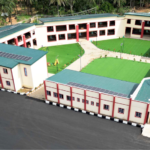- Home
- Features
- Startup Zone
- Projects
- Policies
- Shop
- Policies
- Projects
- Startup Zone
- Country Spotlight
- Analysis
- Tech
- Policies
- Projects
- Startup Zone
- Country Spotlight
- Analysis
- More
- Beyond the Kalashnikov: Africa’s Shift Toward Technology-Driven Warfare
- Afrail Express: Uniting a Continent on Rails
- AFRICA’S ENERGY CORRIDORS: CONNECTING POWER, PEOPLE, AND PROSPERITY
- Startup Lions Campus: Empowering Kenya’s Digital Generation
- L’Art de Vivre’s Le Paradis de Mahdia: Tunisia’s Model for Sustainable Luxury
- The Lobito Corridor: Rewiring Africa’s Trade Arteries Through Strategic Infrastructure
- AFRICA’S GREEN ENERGY TRANSITION: A BEACON OF HOPE FOR CLIMATE ACTION
- Dangote Refinery: Showcasing Africa’s Project Success Story
- AFRICA GREEN ECONOMY: ALL YOU NEED TO KNOW
- The Most Important Amicus Brief in the History of the World
- The Rise of Indigenous UAVs: Africa’s Drone Capabilities in Warfare and Surveillance
- AFRICA’S LARGEST OIL PRODUCERS: A COMPREHENSIVE OVERVIEW
- Beyond the Kalashnikov: Africa’s Shift Toward Technology-Driven Warfare
- Afrail Express: Uniting a Continent on Rails
- AFRICA’S ENERGY CORRIDORS: CONNECTING POWER, PEOPLE, AND PROSPERITY
- Startup Lions Campus: Empowering Kenya’s Digital Generation
- L’Art de Vivre’s Le Paradis de Mahdia: Tunisia’s Model for Sustainable Luxury
- The Lobito Corridor: Rewiring Africa’s Trade Arteries Through Strategic Infrastructure
- AFRICA’S GREEN ENERGY TRANSITION: A BEACON OF HOPE FOR CLIMATE ACTION
- Dangote Refinery: Showcasing Africa’s Project Success Story
- AFRICA GREEN ECONOMY: ALL YOU NEED TO KNOW
- The Most Important Amicus Brief in the History of the World
- The Rise of Indigenous UAVs: Africa’s Drone Capabilities in Warfare and Surveillance
- AFRICA’S LARGEST OIL PRODUCERS: A COMPREHENSIVE OVERVIEW
- Beyond the Kalashnikov: Africa’s Shift Toward Technology-Driven Warfare
- Afrail Express: Uniting a Continent on Rails
- AFRICA’S ENERGY CORRIDORS: CONNECTING POWER, PEOPLE, AND PROSPERITY
- Startup Lions Campus: Empowering Kenya’s Digital Generation
- L’Art de Vivre’s Le Paradis de Mahdia: Tunisia’s Model for Sustainable Luxury
- The Lobito Corridor: Rewiring Africa’s Trade Arteries Through Strategic Infrastructure
- Startup Zone
Top Insights
Engineering Excellence: Africa’s Top 5 Infrastructure Schools and Their Global Impact
As Africa continues to rise as a hub of engineering talent and innovation, its universities will remain the cornerstone of this transformation—training the builders of tomorrow’s Africa.

Africa’s future hinges on the strength and ingenuity of its engineers—the innovators, designers, and problem-solvers who will build the continent’s infrastructure and drive sustainable development. As the continent faces rapid urbanisation, energy demands, transportation needs, and climate challenges, education emerges as the vital pipeline nurturing the next generation of African builders. Several universities and organisations across Africa are leading the charge, equipping students with the skills, research capabilities, and innovative mindset necessary to transform infrastructure across the continent and beyond.
The Power of Education as a Catalyst for Infrastructure Development
Education is more than just acquiring degrees; it is the foundation upon which sustainable infrastructure and economic resilience are built. Top-tier engineering institutions in Africa are not only training skilled professionals but also fostering research, innovation, and leadership that directly impact infrastructure projects—from water management and renewable energy to transportation networks and urban planning.
Leading African Engineering Institutions and Their Global Impact.
Below are some of the most influential universities and centres of excellence in Africa that are shaping the continent’s engineering landscape:
1. University of Cape Town (South Africa)
Ranked among Africa’s best, UCT’s Faculty of Engineering and the Built Environment produces graduates and research that have influenced infrastructure projects across the continent. Its focus on sustainable urban development, renewable energy, and climate resilience positions it as a leader in innovative engineering solutions.
2. Stellenbosch University (South Africa)
Known for its rigorous research programs, Stellenbosch’s Faculty of Engineering offers degrees in civil, electrical, mechanical, and process engineering. Its emphasis on research-driven innovation supports infrastructure projects that address water scarcity, energy access, and environmental sustainability.
3. Cairo University (Egypt)
With a history dating back to 1908, Cairo University’s Faculty of Engineering is a powerhouse of knowledge in construction, transportation, and environmental engineering. Its collaborations with regional and international agencies bolster infrastructural development in Egypt and neighbouring countries.
4. University of Pretoria (South Africa)
A leading research university, Pretoria offers comprehensive engineering programs in civil, chemical, electrical, and computer engineering. Its focus on smart infrastructure, digital innovation, and sustainable urban planning influences projects across Africa.
5. University of Witwatersrand (South Africa)
Wits’ Engineering School is renowned for its contributions to mining, environmental, and civil engineering. Its research in water treatment, infrastructure resilience, and environmental sciences supports Africa’s efforts to build climate-adaptive infrastructure.
Specialised Centres of Excellence and Their Impact
Apart from traditional universities, Africa has established several Centres of Excellence aimed at solving sector-specific challenges:
• Africa Higher Education Centers of Excellence (ACE): Support specialised training in water, sanitation, mining, climate change, and coastal resilience, developing local solutions and engineering talent tailored to regional needs.
• 2iE (Burkina Faso): Focuses on water science, technology, and renewable energy research, directly impacting infrastructure development in water security and sustainable energy.
• INP-HB (Ivory Coast): Specialises in mining and environmental solutions, supporting resource-based infrastructure projects.
• ACECoR (Ghana): Concentrates on coastal resilience, marine conservation, and sustainable fisheries, fostering environmentally sustainable infrastructure practices.
Global Recognition and Impact
African universities such as the University of Cape Town, Witwatersrand, and Cairo University are ranked highly in global university rankings, reflecting their academic excellence and research output. Their influence extends beyond Africa through international collaborations, joint research projects, and knowledge exchange that elevate the continent’s engineering standards.
Building the Future: Education’s Role in Infrastructure Development
The impact of Africa’s top engineering schools resonates through:
• Training skilled engineers: Graduates who lead infrastructure projects in energy, transportation, water, and urban development.
• Driving innovation: Research that yields new technologies and sustainable practices tailored to Africa’s unique challenges.
• Fostering collaborations: Partnerships with international universities, governments, and private sectors that accelerate project implementation.
• Promoting inclusive growth: Initiatives to empower women in engineering, such as the Association of Professional Women Engineers of Nigeria (APWEN), expanding the talent pool and ensuring diverse leadership.
Embracing Digital and Lifelong Learning
Recognising the rapid evolution of technology, institutions like the Africa Centre of Excellence on Technology-Enhanced Learning (ACETEL) are pioneering digital education models—hybrid, online, and blended learning—to widen access and prepare students for a digital-first world. These efforts ensure that Africa’s future engineers are equipped not only with traditional skills but also with expertise in emerging fields such as smart infrastructure, IoT, and AI.
Conclusion
Education as Africa’s Engine of Infrastructure Transformation
Africa’s next wave of infrastructure development depends on the pipeline of talented, innovative, and globally-minded engineers nurtured within its universities and centres of excellence. By investing in high-quality education, fostering research and innovation, and promoting inclusive participation, Africa can build resilient, sustainable, and technologically advanced infrastructure that underpins economic growth and social progress.
As Africa continues to rise as a hub of engineering talent and innovation, its universities will remain the cornerstone of this transformation—training the builders of tomorrow’s Africa.
Recent Posts
Related Articles
Cutting-Edge Environmental Conservation Projects and Their Champions
Environmental conservation has entered a decisive era. As climate change accelerates, biodiversity...
ByafricaprojectJanuary 28, 2026Clean Water Access Projects Improving Lives in Underserved Regions
Access to clean and reliable water remains one of Africa’s most pressing...
ByafricaprojectJanuary 19, 2026Industrial Corridors Attracting Global Investors
Across Africa, industrial corridors are emerging as strategic economic arteries driving industrialization,...
ByafricaprojectJanuary 16, 2026The Engineers Behind Africa’s Tallest and Most Iconic Towers
Across Africa, the rise of tall and iconic towers is reshaping skylines...
ByafricaprojectJanuary 15, 2026












